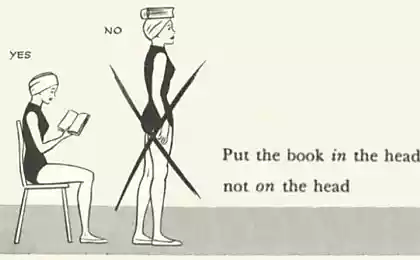419
Speak correctly!

These 16 tips will make your communication with other people is much legche.Inogda us so difficult to agree with the others, although it seems that we do not utter anything wrong. Psychologists say that often hinder productive communication familiar to us the word.
Website provides 16 tips on how to properly, safely and convincingly convey their thoughts to the interlocutor.
Talk «and» instead of «but» example em>: «That you have done well, and if you ...»
instead of em>: «Yes, it's good, but you should ...»
Because "but" negates all that has been said before him. Talk «and» instead of «yet» example em>: «I understand that you can not answer so fast and so let's ...»
instead of em>: «I understand that you can not answer right now, and yet it would be better ...»
Because "all the same," said the source that you deeply care about his wishes, expectations, doubts or questions. Use the word «for» instead of the word «against» example em>: «In order for something has changed, I will record in the sports section».
instead of em>: «What would I still come up against boredom?" Avoid rough «No» , because «No» , uttered with appropriate intonation can make a negative impression on the partner. Cross out the expression «honest» from your vocabulary, because it sounds like honesty exception for you. Talk «wrong» , «not now» instead of «No» example em>: «In this form, I do not like"; "At the moment I do not have time for it».
instead of em>: «No, I do not like it"; "No, I have no time».
Because "no" repulsive. "No" - it is something completed and the final decision. Change the angle of view, using the word «already» instead of the word «More» example em>: «You have done half».
instead of em>: «You still only half done?»
Because the word "already" turning a little into a lot. Forever remember the word «only» and «just» , or replace them with others.
example em>: «This is my opinion"; "This is my idea».
instead of em>: «I just express my opinion"; "It's just such an idea».
Because "only" and "just" do your words excuse. Remove the word «wrong» example: em> «It did not work out as expected. Let's think about how to fix the error, or to avoid it in the future ».
instead of em>: «Wrong! This is all your fault. " Talk «in» and «in so much» instead of «somewhere» and «near» . Just assign the expiration date and time.
example em>: «I call on Friday"; "I'll call you tomorrow at 11 o'clock».
instead of em>: «I'll call you later in the week"; "I'll call you tomorrow around 11". Ask open-ended questions. Not content with monosyllabic answers «yes» or «No» example em>: «How do you like it?"; "When can I call you back?».
instead of em>: «Do you like it?"; "You will be able to call you back?».
Because the questions starting with "how", "what" or "who" is produced valuable information. Use the expression «From this moment on, I ...» instead of «if I ...» example em>: «From this moment I will carefully listen to the advice».
instead of em>: «If I had listened to his advice, then this would have happened».
Because "if I ..." regrets that it has been, and rarely makes it go further. It is better to look to the future. The phrase "from now on I ..." - a good basis for such a position. Stop evading using the «ought» and «have to be» better em>: «It is important to do this job in the first place».
instead of em>: «It is necessary to think about it"; "You have to first finish the job».
"It would be necessary" and "would need to" not say anything specific. It is better to clearly name of (or something) who or what you're talking ("I" - "you" - "you" - "we are»).
example em>: «You should finish it"; "You should give priority to this work." Talk «I do» or «I wish» instead of «I» example em>: «I would like first to think a little"; "I first gather the necessary information».
instead of em>: «I must first think a little"; "I have to collect information».
"I have to" is due to coercion, pressure or external definition. Everything that you do with such a setting, you do involuntarily. "I do" or "I would like" sounds much more positive for other, more friendly and motivated. Cross out the word «actually» and «fact» from your vocabulary.
example em>: «That's right».
instead of em>: «Well, actually, it's right».
"Generally" contains no information and is perceived as a limitation. Talk «I recommend you» instead of «you have to» example em>: «I advise you to trust me"; "I encourage you to think about it"; "I advise you to take a decision as soon as possible».
The word "should" you expose the interlocutor pressure and robs him an opportunity to make a decision. "I recommend that you" sounds much more friendly and positive.
via adme.ru
20 entries in the diaries, after which we wanted to go back to school
I would like the world to know about this man























